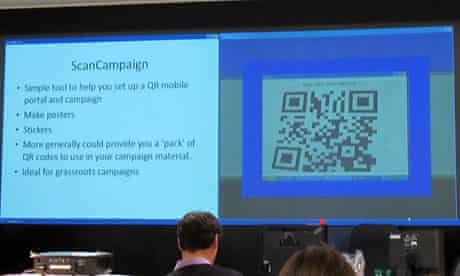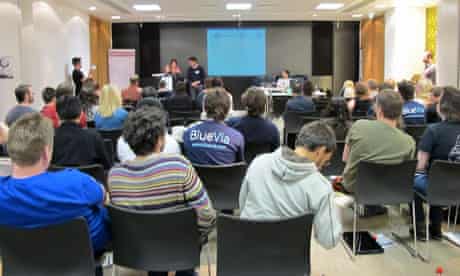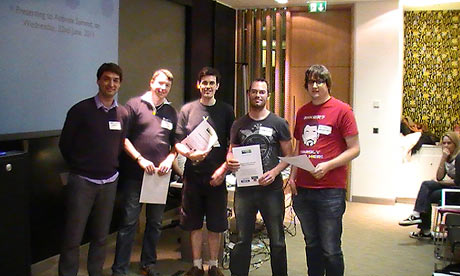The Activate 2011 event kicked off with a hack day held at the Guardian HQ at Kings Place in London. Full details of the event can be found on the (H)activate page on the Rewired State site at http://rewiredstate.org/events/hactivate-2011, and details of all the projects can be found at http://rewiredstate.org/projects and http://benrmatthews.posterous.com/tag/activate.
I was a lucky enough to get to participate in this event and rather than rehash a big list of projects, I’ll pick out a couple of interesting ones that caught my eye. This is purely personal, and hopefully I’ll be able to add a little developer contribution to Emma Mulqueeny’s great post at http://mulqueeny.wordpress.com/2011/06/19/whats-the-point-of-a-hack-day/.
I’ll start with the winners, a project (it’s not a hack any more) called Safe Trip. This is a great example of a really strong idea that, at least from my perspective, became really fleshed out over the weekend. When I spoke to the guys briefly on Saturday they told me of their basic premise: to allow users to say where they expected to be on a certain date, and if they had not been in contact before a certain date, to raise the alarm.

When they demoed they had a full platform where you could search for users in danger, it had an admin interface and full SMS integration. It was fantastic and they were worthy winners. It was the way they went from a basic idea to a fully fledged product in 24 hours that really caught my eye.
A feature of hackers on hack days is to keep adding features right up to the last minute. The FreeHoc team appeared from their Twitter stream to be making breakthroughs quite late on (it appeared testing started with less than an hour to go). Another feature is to keep adding features even though people may not even see them – FreeHoc had so much stuff that even their longer than normal presentation time was not long enough to show off all their labours.
A notable mention goes to TouchyPeely. These guys did something else which is common to hackers on hack days – trying something new. Emma talks of this in her piece and it is a crucial component in, I guess, the excitement of the event for devs: “Can I do this thing I’ve just thought of, by tomorrow, using technologies I have never touched before?”
They used node.js which they hadn’t tried before and still managed to make the coolest looking app of the weekend (IMHO). It placed people who compost and users of compost together (@penelopejones “the match.com of composting”) – again including full SMS integration. A great idea, and beautifully implemented.
Both of these hacks were fully fledged platforms, another great project was more of a utility. ScanCampaign allows users to generate their own QR codes, which the author hoped could be used for donations to charity or for campaigns such as UK Uncut – to quickly share information.

This was really simply done: people could quickly generate their code, and this was cleverly illustrated by the author creating a poll and distributing a printed QR code to vote with to all the participants for part of his demo.
The last project I’ll mention is Green Incorporation. These guys made a third type of application – a mash-up. They took data from numerous sources to provide a view on a companies ethical status. It included a profiler where you enter your preferences on which environmental concerns you cared about the most and the app would provide suggestions on companies which fitted your “green” criteria.

Taking disparate data sources and giving them a unified view is tricky: do the data sets match? can you link the concepts contained? and so on. These guys did a great job doing those things and provided plenty of hooks for further thought.
All the projects were interesting – I haven’t mentioned the alternative to money proposed by Traeder, or the mobile voting platform made by Iterative, both of whom won prizes – and the selection above is simply picked to provide a cross-section.
Hack days are incredibly tiring – I was coding mine at 10:30pm on the Saturday and 8:30am on the Sunday morning. Traeder coded some of theirs in St Pancras, where there was “free Wi-Fi!”. It’s the combination of tight deadlines, new tech and competition that drive the participants to keep going when really they should stop and take a break, maybe visit their families. It was, after all, Fathers’ Day!
The best thing about this event though was that the winners – SafeTrip – will see their hack turned into a real product. Great ideas get banded about but the danger is they get dropped or forgotten; a forum for taking these forward is important. All the projects are listed on Rewired State, many are on github; hopefully some of the ideas will extend beyond the two days.
